Unit 1 Living with technology Grammar and usage(1)课件(24张)
文档属性
| 名称 | Unit 1 Living with technology Grammar and usage(1)课件(24张) |

|
|
| 格式 | zip | ||
| 文件大小 | 532.9KB | ||
| 资源类型 | 教案 | ||
| 版本资源 | 牛津译林版 | ||
| 科目 | 英语 | ||
| 更新时间 | 2019-07-30 00:00:00 | ||
图片预览

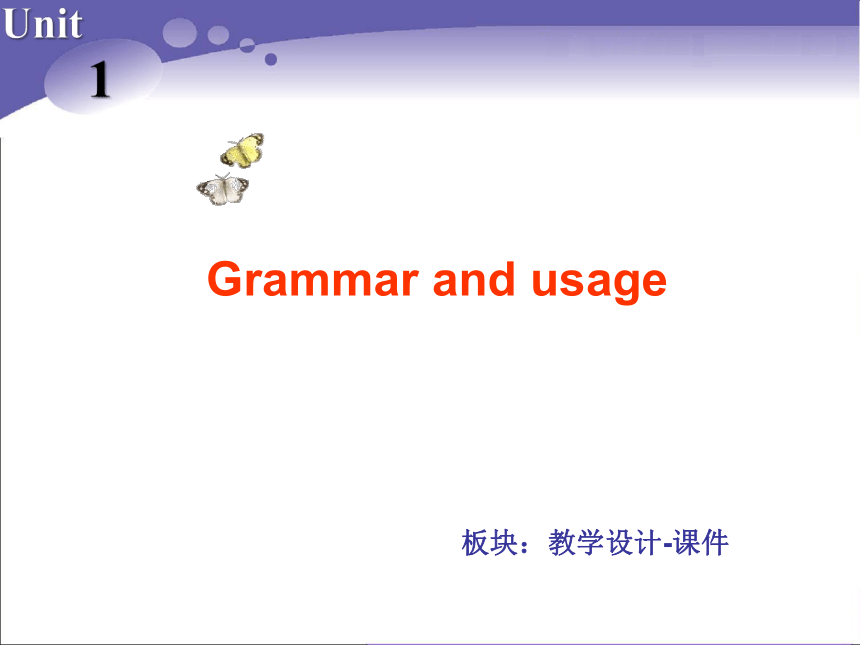
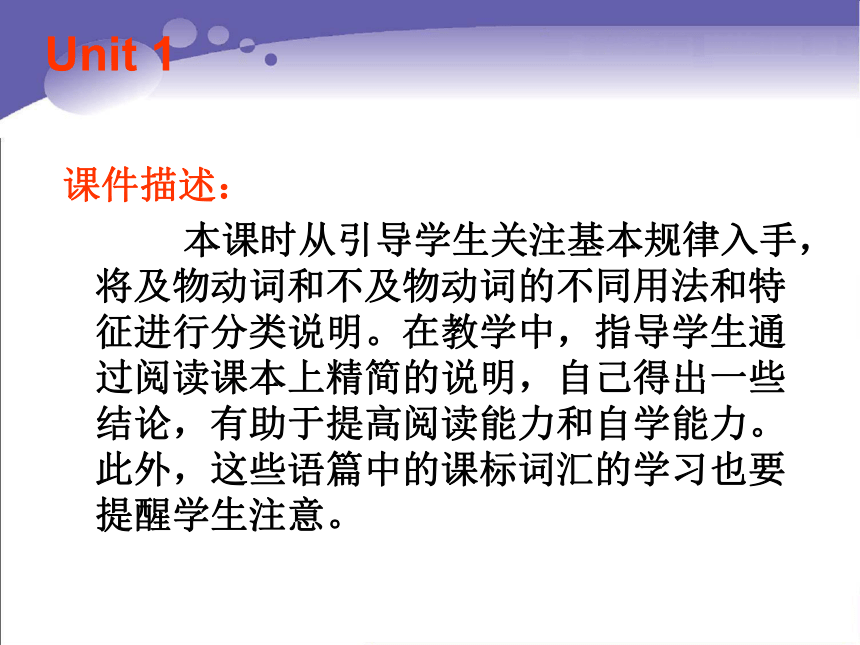
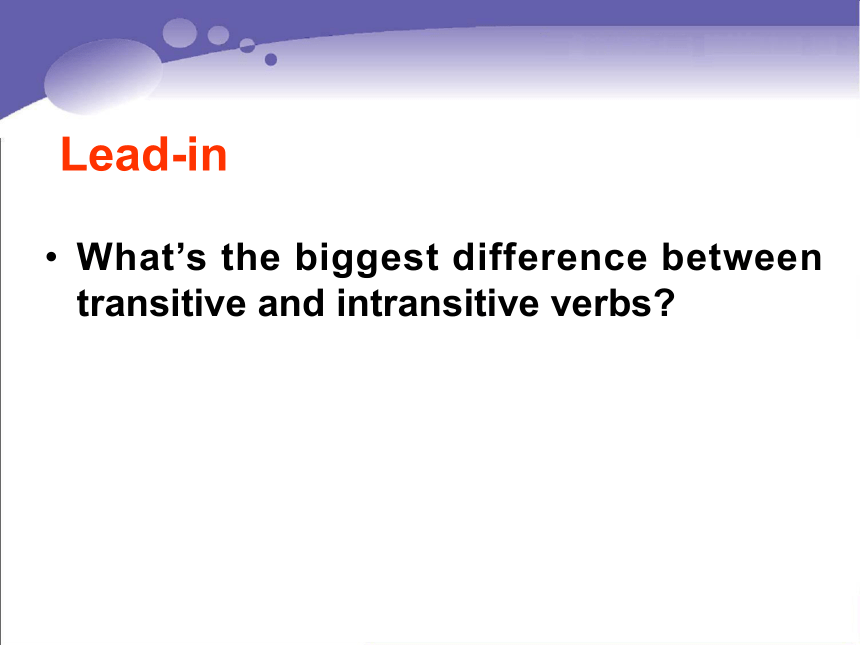
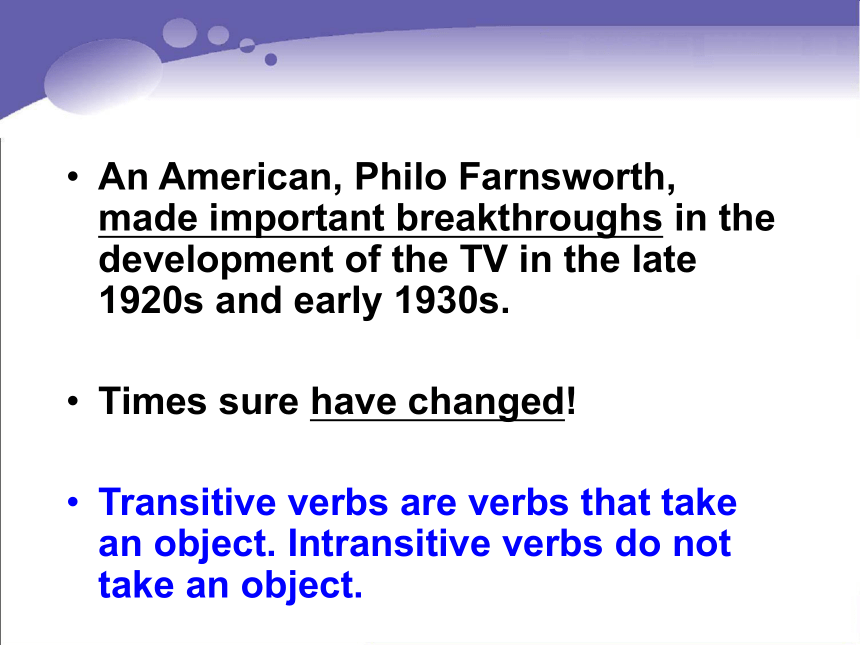
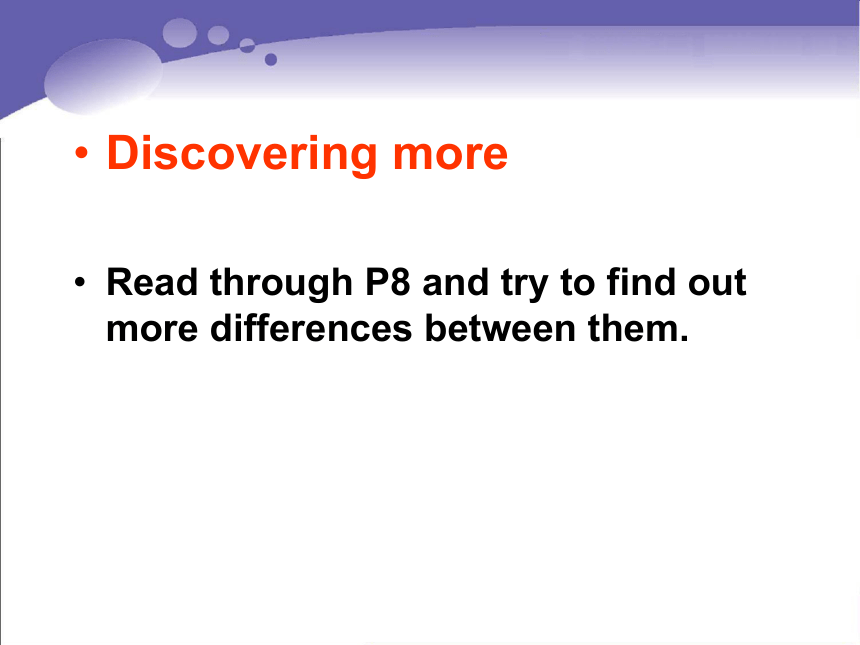
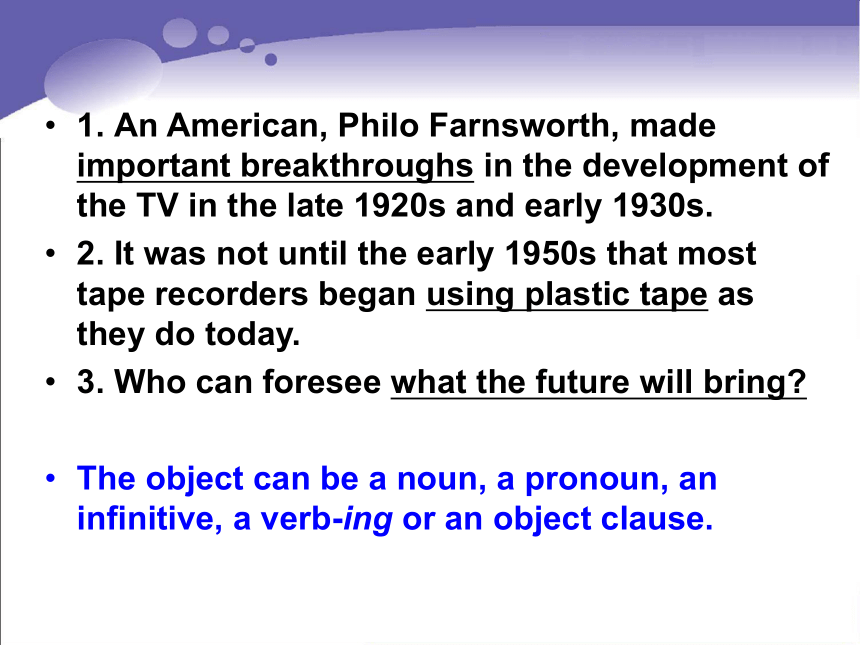
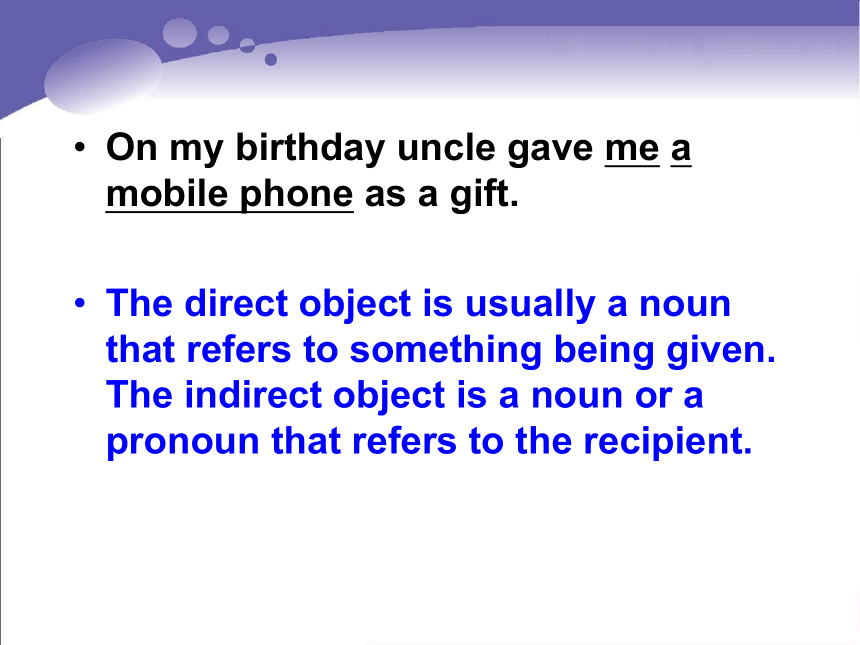
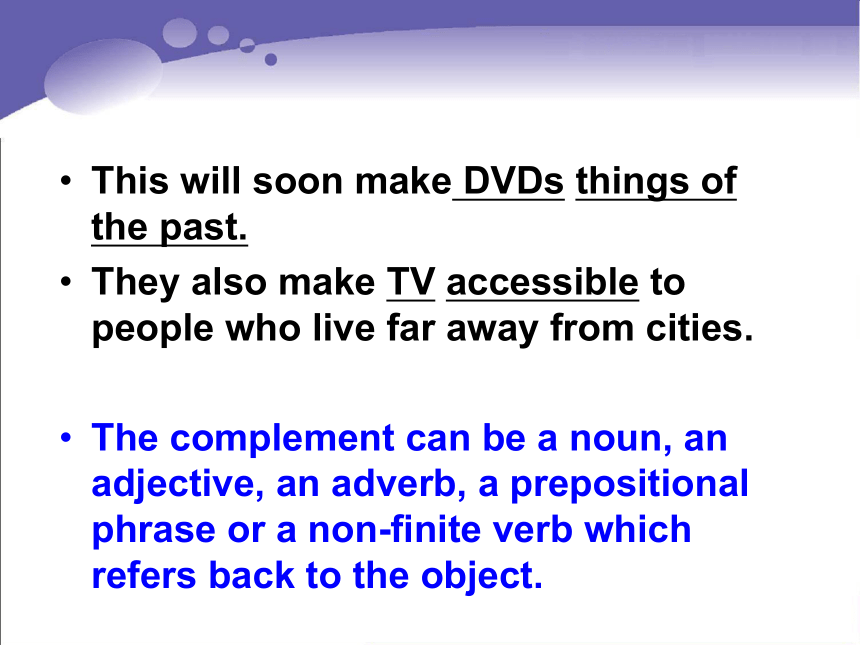
文档简介
课件24张PPT。牛津高中英语(模块七 ·高二下学期)Advance with EnglishUnit1Grammar and usage
板块:教学设计-课件
Unit 1课件描述:
本课时从引导学生关注基本规律入手,将及物动词和不及物动词的不同用法和特征进行分类说明。在教学中,指导学生通过阅读课本上精简的说明,自己得出一些结论,有助于提高阅读能力和自学能力。此外,这些语篇中的课标词汇的学习也要提醒学生注意。Lead-inWhat’s the biggest difference between transitive and intransitive verbs?
An American, Philo Farnsworth, made important breakthroughs in the development of the TV in the late 1920s and early 1930s.
Times sure have changed!
Transitive verbs are verbs that take an object. Intransitive verbs do not take an object.Discovering more
Read through P8 and try to find out more differences between them.1. An American, Philo Farnsworth, made important breakthroughs in the development of the TV in the late 1920s and early 1930s.
2. It was not until the early 1950s that most tape recorders began using plastic tape as they do today.
3. Who can foresee what the future will bring?
The object can be a noun, a pronoun, an infinitive, a verb-ing or an object clause.
On my birthday uncle gave me a mobile phone as a gift.
The direct object is usually a noun that refers to something being given. The indirect object is a noun or a pronoun that refers to the recipient.
This will soon make DVDs things of the past.
They also make TV accessible to people who live far away from cities.
The complement can be a noun, an adjective, an adverb, a prepositional phrase or a non-finite verb which refers back to the object. By the late 1970s, video recorders
small and cheap enough for home use
were introduced.
Most transitive verbs can be used in
the passive voice.
Times sure have changed!
Intransitive verbs do not take an object, and cannot be used in the passive voice.
The waters rose higher and higher, until more than 1,000 people had to leave their homes.
More challenges lie ahead of me.
Intransitive verbs can usually be followed by an adverbial.
Bored with life in the city, he moved to a remote village accessible only by boat.
Some intransitive verbs can be followed by a prepositional phrase.
Mum is cooking (breakfast) in the kitchen now.
To everyone’s surprise, he contributed $5,000 to a local charity.
Many different people contributed to the development of TV.
Many verbs can be both transitive and intransitive.
PracticeP9 A
1. checked (vt.)
2. bought (vt.)
3. sitting (vi.)
4. see (vt.)
5. talked (vi.)
6. turned (vi.)
7. hurts (vi.)
8. eat (vt.)
9. thought (vt.)
10. smiled (vi.)P9 B
1. a. answer b. answer for
2. a. fail (in) b. fail
3. a. suffering b. suffered from
4. a. allow b. allow for
5. a. brought b. bring about
6. a. paid b. To pay for
7. a. Having searched b. searching for answer for
to explain to people in authority why you did something wrong or why something happened, and be punished if necessary
Their coach must answer for the team's poor performance. suffer from (pain)
to experience physical or mental pain
At least he died suddenly and didn't suffer. She's suffering a lot of pain.
suffer from I'm suffering from a bad back. Mary's suffering from ill health at the moment.
allow for
to consider the possible facts, problems,
costs etc. involved in something when making a
plan, calculation, or judgment
Allowing for inflation, the cost of the project will
be $2 million.
You should always allow for the possibility that
it might rain. bring about
to make something happen
How can we bring about a change in attitudes?
A huge amount of environmental damage has
been brought about by the destruction of the
rainforests. pay for
pay for sth.
Mum paid for my driving lessons.
pay sb. for sth.
He didn't even offer to pay me for the ticket. search for
search for
An RAF plane searched for the missing men.
I've searched everywhere for my glasses.
search sth./sb. for sth.
Detectives are searching the yard for clues.
He was searched by the guards for weapons.
search for to try to find an explanation or solution
Scientists are still searching for a cure.
She paused, searching for inspiration.
Word study1. I had ample time to wait.
2. We had a casual conversation.
3. medical insurance
4. It was obvious that …
5. He was trembling with his sufferings.
Homework
Finish P104 C1, C2.
板块:教学设计-课件
Unit 1课件描述:
本课时从引导学生关注基本规律入手,将及物动词和不及物动词的不同用法和特征进行分类说明。在教学中,指导学生通过阅读课本上精简的说明,自己得出一些结论,有助于提高阅读能力和自学能力。此外,这些语篇中的课标词汇的学习也要提醒学生注意。Lead-inWhat’s the biggest difference between transitive and intransitive verbs?
An American, Philo Farnsworth, made important breakthroughs in the development of the TV in the late 1920s and early 1930s.
Times sure have changed!
Transitive verbs are verbs that take an object. Intransitive verbs do not take an object.Discovering more
Read through P8 and try to find out more differences between them.1. An American, Philo Farnsworth, made important breakthroughs in the development of the TV in the late 1920s and early 1930s.
2. It was not until the early 1950s that most tape recorders began using plastic tape as they do today.
3. Who can foresee what the future will bring?
The object can be a noun, a pronoun, an infinitive, a verb-ing or an object clause.
On my birthday uncle gave me a mobile phone as a gift.
The direct object is usually a noun that refers to something being given. The indirect object is a noun or a pronoun that refers to the recipient.
This will soon make DVDs things of the past.
They also make TV accessible to people who live far away from cities.
The complement can be a noun, an adjective, an adverb, a prepositional phrase or a non-finite verb which refers back to the object. By the late 1970s, video recorders
small and cheap enough for home use
were introduced.
Most transitive verbs can be used in
the passive voice.
Times sure have changed!
Intransitive verbs do not take an object, and cannot be used in the passive voice.
The waters rose higher and higher, until more than 1,000 people had to leave their homes.
More challenges lie ahead of me.
Intransitive verbs can usually be followed by an adverbial.
Bored with life in the city, he moved to a remote village accessible only by boat.
Some intransitive verbs can be followed by a prepositional phrase.
Mum is cooking (breakfast) in the kitchen now.
To everyone’s surprise, he contributed $5,000 to a local charity.
Many different people contributed to the development of TV.
Many verbs can be both transitive and intransitive.
PracticeP9 A
1. checked (vt.)
2. bought (vt.)
3. sitting (vi.)
4. see (vt.)
5. talked (vi.)
6. turned (vi.)
7. hurts (vi.)
8. eat (vt.)
9. thought (vt.)
10. smiled (vi.)P9 B
1. a. answer b. answer for
2. a. fail (in) b. fail
3. a. suffering b. suffered from
4. a. allow b. allow for
5. a. brought b. bring about
6. a. paid b. To pay for
7. a. Having searched b. searching for answer for
to explain to people in authority why you did something wrong or why something happened, and be punished if necessary
Their coach must answer for the team's poor performance. suffer from (pain)
to experience physical or mental pain
At least he died suddenly and didn't suffer. She's suffering a lot of pain.
suffer from I'm suffering from a bad back. Mary's suffering from ill health at the moment.
allow for
to consider the possible facts, problems,
costs etc. involved in something when making a
plan, calculation, or judgment
Allowing for inflation, the cost of the project will
be $2 million.
You should always allow for the possibility that
it might rain. bring about
to make something happen
How can we bring about a change in attitudes?
A huge amount of environmental damage has
been brought about by the destruction of the
rainforests. pay for
pay for sth.
Mum paid for my driving lessons.
pay sb. for sth.
He didn't even offer to pay me for the ticket. search for
search for
An RAF plane searched for the missing men.
I've searched everywhere for my glasses.
search sth./sb. for sth.
Detectives are searching the yard for clues.
He was searched by the guards for weapons.
search for to try to find an explanation or solution
Scientists are still searching for a cure.
She paused, searching for inspiration.
Word study1. I had ample time to wait.
2. We had a casual conversation.
3. medical insurance
4. It was obvious that …
5. He was trembling with his sufferings.
Homework
Finish P104 C1, C2.
